Sandy Bridge Memory Scaling: Choosing the Best DDR3
by Jared Bell on July 25, 2011 1:55 AM EST3DMark 11
We're going to start the graphics benchmarks with the synthetic 3DMark test. The latest version, 3DMark 11, is still very GPU dependent. However, it does include a CPU Physics test and a combined graphics/physics test for simulating those types of loads. We’ll use the overall score with the three subtests to see if we can find any areas where memory performance makes a noticeable difference.
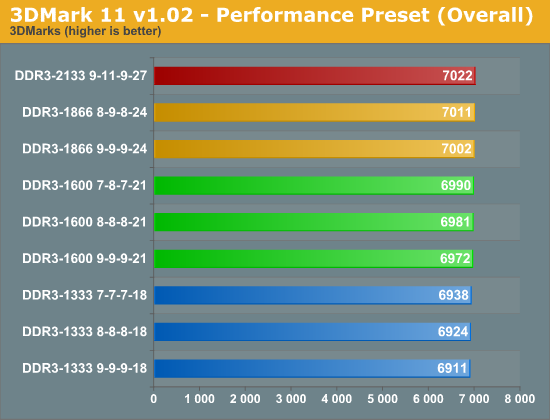
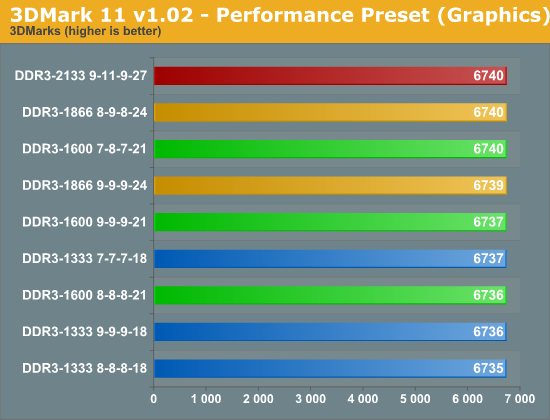
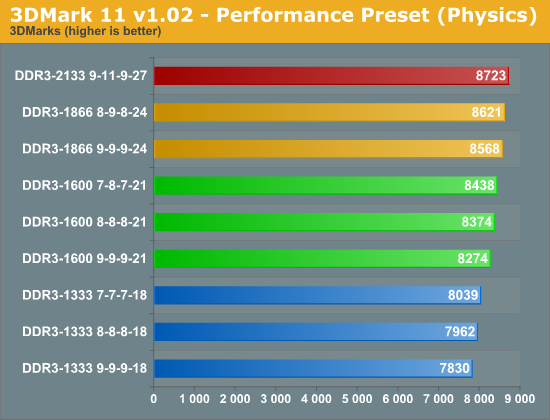
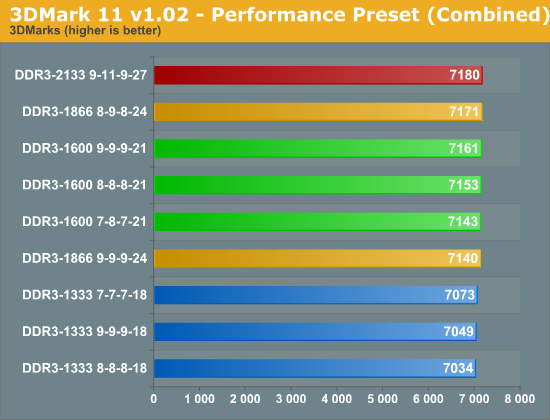
The overall score, which is heavily based on the graphics tests, shows a mere ~1% change across the board. When you get to the graphics test, you can see that the faster memory makes absolutely no difference at all. It's not until we get to the physics test where we see some improvement from increasing the memory speed. We get performance boost of up to 11% when going from DDR3-133 to DDR3-2133. The combined test entails the rendering of a 3D scene with the GPU while performing physics tasks on the CPU. Here again, were see a very small 2% increase in performance from the slowest to the fastest.
Crysis and Metro 2033
Based on 3DMark 11, then, we’d expect most games to show very little improvement from upgrading your memory, but we ran several gaming benchmarks just to be sure. I decided to combine the analysis for Crysis: Warhead and Metro 2033 due to the virtually non-existent differences observed during these tests. Crysis: Warhead was the previous king of the hill when it came to bringing video cards to their knees. The newer kid on the block, Metro 2033, has somewhat taken over that throne. Just how do they react to the various memory configurations we're testing today?
It's worth noting that the settings used here are the settings that I would actually play these games at: 1920x1080 with most of the high quality features enabled. Frame rates are well above 30, so definitely playable, though they’re below 60 so some would say they’re not perfectly smooth. Regardless, unless you play at settings where your GPU isn’t the primary bottleneck, you should see similar scaling from memory performance.
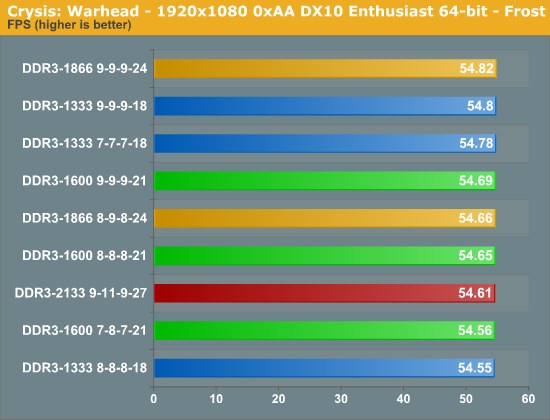
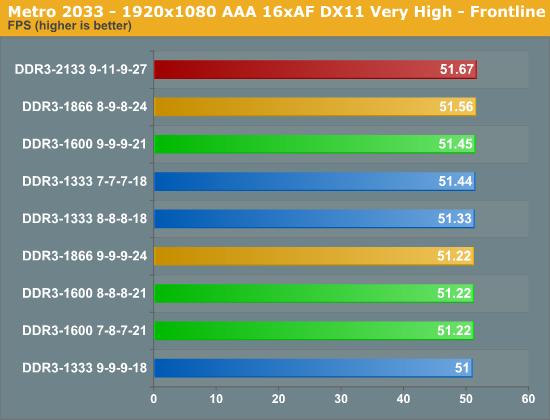
The results weren't very stimulating, were they? Just as expected, gaming with faster memory just doesn't make any notable difference. I could have potentially lowered the resolution and settings in an attempt to produce some sort of difference, but I felt that testing these games at the settings they're most likely to be played at was far more enlightening. If you want better gaming performance, the GPU is the best component to upgrade—no news there.










76 Comments
View All Comments
Black1969ta - Monday, July 25, 2011 - link
This article ignores a very important factor in choosing RAM, that is overclocking ability, sure the delta between 1333 and 2133 is not very large within the same stick of RAM that is down-clocked but what about a 1333 stick that is overclocked. Can the $50 stick of 1333 perform at 2133 or even 1866, etc... that the $150 DDR3-2133 does with no problem.I would like to get a i7-2600K and overclock it to 4.8GHz, but I wanted to know the cheapest stick of RAM that will allow that with no compromise, this article doesn't tell anything useful, sure a good expensive stick is a good expensive stick at any speed, but what about a cheaper stick?
compudaze - Monday, July 25, 2011 - link
That's a chance you just have to take youself. Just because my brand X model Y value DDR3-1333 ram will run at DDR3-2133 CL9 at 1.65V doesn't mean that you're guaranteed to get the same results if you buy the same make/model value DDR3-1333 ram. Same with CPU's & GPU's.xsilver - Friday, August 5, 2011 - link
but for someone not in the know, how well generally does 1333 ram overclock. Some generations the bargain basement ram has no headroom at all and some generations, most basement ram has enough headroom to get where you need.Also, as an addendum, maybe you could also test ram size scaling as well as speed. I as well as others maybe contemplating 16gb ram and wondering if its worth it.
Chris383 - Monday, July 25, 2011 - link
I think you guys are missing the point of faster memory. It just depends on the work load most applications are written for linear code or at least i am guessing so. But what happens when you add more than one program at the same time or 3-5 programs at the same time i think then you would start to see why memory performance really does matter. And some games not most but some games will start to show a very big increase in performance with faster memory. Example FarCry2, GTA4, Starcraft2, now some of this maybe caused by poor memory management of the video card or lack of vmem but from my findings even with enough vmem you still will see some very big changes in FPS with faster/tighter memory speeds (provided your not cpu or gpu limited)That being said for most people playing games at lower resolutions like 1080 and below memory speed is really not needed 1333 will suffice plenty good but when your doing 3,4+MP screens you will defiantly want to take into consideration some faster memory for your rig.
ypsylon - Tuesday, July 26, 2011 - link
I don't get it why home users are so over-excited about memory over 1600 MHz? For gaming buying e.g. 2133 memory is as wise as buying Mercedes Maybach for trips to local grocery store.Fast memory has very limited usage (medicine, NASA etc...) and certainly home desktop/gaming rig doesn't qualify for that. Furthermore if you want to OC system, then whole point of OC is to buy cheap [read: cheap doesn't = crap] and squeeze every little bit of performance out of it. Stay at 1333/1600 level. 2000 or more is for [beeep!] with humongous e-penis running benchmarks 365/24/7. Biggest advantage of 1333/1600 range is that by default pretty much every chipset and motherboard support it right now.
Running perfectly standard Kingstons 1333 at 1800 without any fancy cooling or changed timings, just bumped BClk on my x58. Even with current prices I'm 100$+ up just by doing this (2 triple sets). And RAMDisk created on that memory certainly isn't slow and eats every SSD for breakfast.
Hrel - Tuesday, July 26, 2011 - link
SO happy you posted this. I JUST ordered a new laptop, didn't upgrade the RAM at all cause it was overpriced. Now I know I'm going to order 2 4GB DIMMS of DDR3 1600 for it, Cas latency 9 be damned, haha. Thanks so much!I was apparently giving way too much credit to CAS latency, I was going to get 1066 Cas 7. Didn't realize pure bandwidth was so important nowadays. I remember an old memory article like this comparing DDR3 for i7 920's and such, whatever that family is called. 1600 cas 7 came out on top their. Odd that Sandy Bridge changes that, but I'm glad I know.
I'd like to see more articles like this, and less articles about EVERY stupid smartphone under the sun.
Rick83 - Wednesday, July 27, 2011 - link
7/1,066,000,000Hz = ~6.56 e-9 s9/1,600,000,000Hz = 5.625 e-9 s
So in fact, the 1600Mhz CL9 RAM has a one nanosecond lower effective latency.
Always remember that CAS latency is in cycles, which take a different amount of time according to the clock speed.
schulmaster - Wednesday, July 27, 2011 - link
Tests are not 'ran', tests are 'run.' You can say we ran tests, but you must say we have run them. This site is way to technically proficient and intelligent for glaring mistakes in homepage articles. I know for at least some of you, English is a second+ language; if that's the case, send me your articles and I'll proof them for free.Black1969ta - Wednesday, July 27, 2011 - link
"This site is way to technically proficient"to here refers to excessive, like too much but you left out the extra "o" so the means something totally different.
If you want to be a Grammar Nazi, use proper English, especially when you are using it as an advertisement.
schulmaster - Thursday, July 28, 2011 - link
my man.